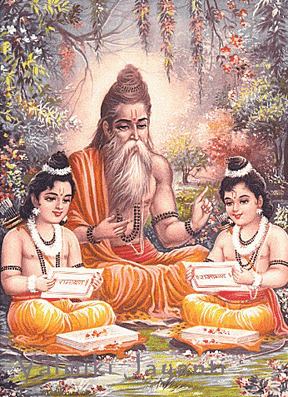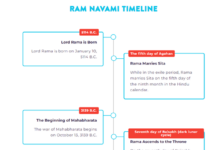
In the previous article of this series (There are qualifications to know the Bhagvad Gita), Swami Nikhilanand explained that only a person who has faith in Shree Krishn is qualified to study the Gita. In this article, Swamiji sheds light on another very important qualification. Verse 34 of Chapter 4 says that the knowledge of the Gita cannot be acquired without first surrendering to a God-realized Saint. Only with his help and guidance could the true meaning of the Gita be understood.
This verse says that we must fully surrender (pranipat) to such a Saint who is both learned in the scriptures (gyaninah) and who has attained God (tattva darshinah). We should humbly and sincerely ask him questions (pariprashn) in order to clear our doubts and clarify the teachings of the Gita. We should also serve him (sevaya). Then he will impart the knowledge of the Gita to us (updekchyanti te gyanam).
Q: Was Arjun surrendered to a Guru?
Swamiji: Yes, in fact, he accepted Shree Krishn as his Guru when he said, ‘shishyasteham shadhi mam tvaam prapannam’ (chapter 2, verse 7). He said, “Krishn, please instruct me. I am your surrendered disciple.” However, it is Krishn’s rule that no one can surrender directly to Him (God). The procedure is that we must come to God through a Guru. He even sent the greatest gyani of that time, Uddhao, to the Gopis of Braj to be graced with Divine love. In other words, He didn’t Grace Uddhao directly, He sent him to the Gopis to make them his Guru. Then the Gopis graced him with Krishn’s Divine love.
Q: Why did Krishn allow Arjun to surrender directly to Him?
Swamiji: In this case, since Krishn was physically present, Arjun had the choice: instead of saying, “Krishn, You are God. Please instruct me.” He said, “Krishn, You are my Guru. Please instruct me.” So, Krishn had to instruct him as a Guru instructs his surrendered disciple. If Arjun had said, “Krishn, You are God. Please instruct me.” Then Shree Krishn would have said, “Go to a Guru. I cannot help you directly, as I am God.”
Q: What is the role of the Guru?
Swamiji: The Guru is like a chemistry professor who instructs his students in the area of his expertise. The professor not only has a theoretical understanding of the subject, but has researched it, performed experiments, and had a practical experience of it. So, his knowledge is not only theoretical, it has been elevated to a practical, experiential level. Similarly, a true Guru must not only have a complete theoretical knowledge of the Hindu scriptures, but, more importantly, a practical experience of God.
Q: Why is surrender important?
Swamiji: After we have found such a Guru, we are then in a position to study the philosophy of the Gita. The first thing we would have to do is to surrender to that Guru. Surrender? What does surrender have to do with acquiring knowledge? It has everything to do with it. In fact, the chemistry students must also surrender to their professor in order to learn. They surrender their intellect, or they join their intellect to the intellect of their professor.
we would have to do is to surrender to that Guru. Surrender? What does surrender have to do with acquiring knowledge? It has everything to do with it. In fact, the chemistry students must also surrender to their professor in order to learn. They surrender their intellect, or they join their intellect to the intellect of their professor.
They allow him to guide them through the journey of acquiring this advanced knowledge of chemistry. They even take some things on faith, because at their elementary level of understanding, they have not experienced any of the things he is teaching them. So, they learn the theory and take it on faith, until such a time when they can experience it for themselves.
That experience is the proof of the theory, which they had accepted on faith. It is important to note that without faith in the teacher, the theory cannot be learned, and without learning the theory, experience cannot be gained. Thus, faith is the gateway to gaining knowledge, and eventually proof or experience.
The same is true for acquiring spiritual knowledge and experience. We must have faith in (be surrendered to) the Guru. The true Saint can make us understand the philosophy of the Gita, but only if we humbly surrender our intellect to him. Initially, we have to accept what he is saying on faith; then, when we practice accordingly, we will receive the experience.
So, in the spiritual field as well, faith and surrender are the gateway to knowledge and experience. Please keep in mind that he can only impart that knowledge to us if we surrender to him. Otherwise, whether they are chemistry students, or students of the philosophy of the Gita, if they doubt every little thing their teacher tells them, they will never be able to learn the advanced material being taught in that course, nor will they ever gain the practical experience of that subject.
They should question, but question humbly, in an effort to understand – not question in an effort to challenge the teacher or show one’s own learning.
There is one more way that the Guru helps his students in their quest for knowledge. This will be the topic of the next part of this series.
Disciple of Shree Kripaluji Maharaj:
Swami Nikhilanand is a Canadian born Hindu spiritual leader based in Austin, Texas. He is a sanyasi disciple and pracharak of Jagadguru Shree Kripaluji Maharaj.
Attracted to the teachings of Hinduism from a young age, Swamiji eventually let his deep spiritual longing lead him to India, where he was most fortunate to come under the guidance of Shree Kripaluji Maharaj. Thereafter, living in the ashrams of JKP, he extensively studied Hindi, the philosophy of the prime Sanskrit scriptures (Vedas, Darshan Shastras, Gita, Bhagwatam), and practiced meditation in the tradition of raganuga bhakti. In 2003, he was given sanyas.
Now, with the blessings of his Guruji, he offers satsang programs throughout America, engaging audiences with his clear explanations of Hindu philosophy coupled with inspired chanting of Sanskrit mantras and shlokas and charming nam sankirtan. His informative and compelling speeches provide practical insight into how to adopt the teachings of Sanatan Dharm into our daily lives, and inspire us to awaken our inner spiritual potential.
To stay in touch with Swami Nikhilanand Ji, like his Facebook page at https://www.facebook.com/SwamiNikhilanand or follow him on twitter at https://twitter.com/Swami_Nikhil.
Swami Nikhilanand






